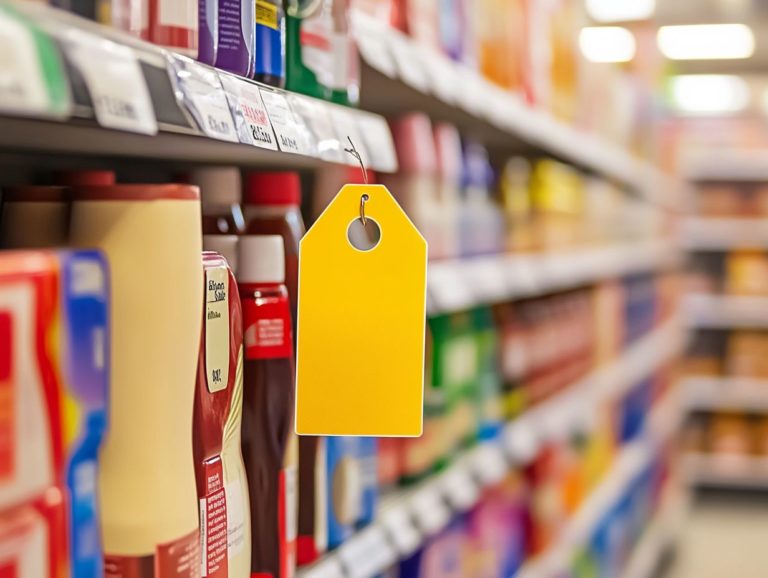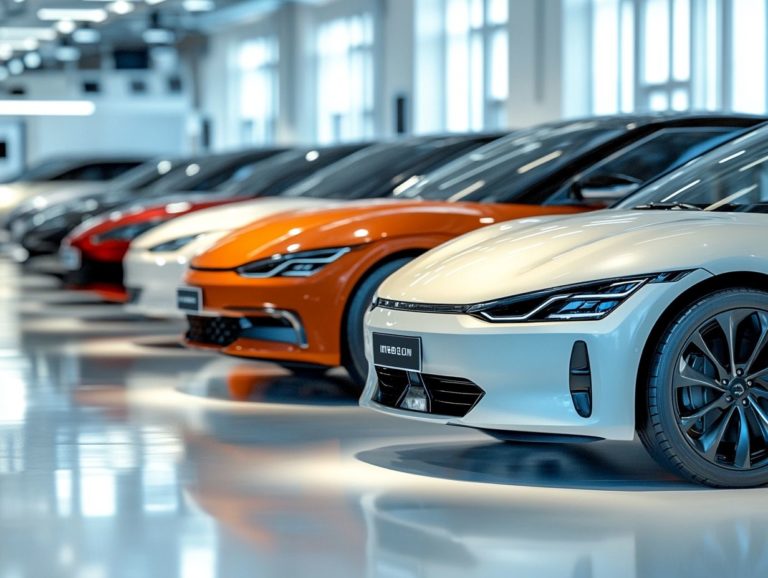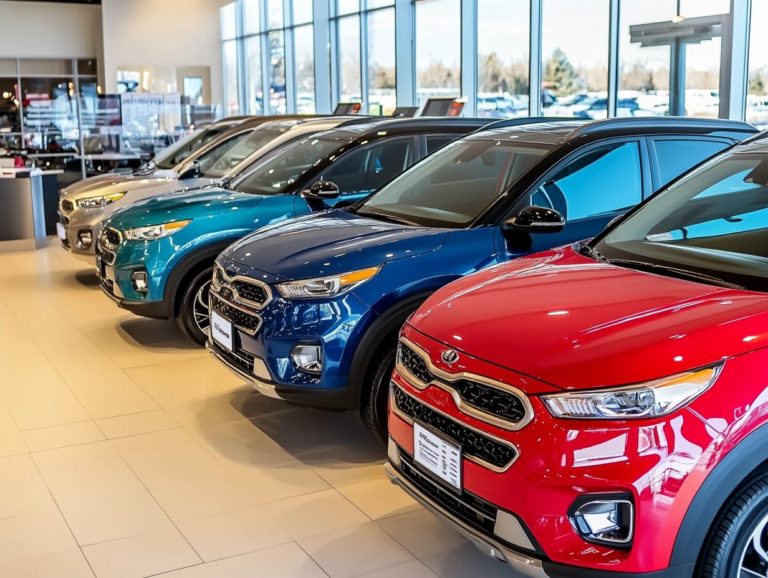Understanding the Hidden Costs of Car Ownership
Car ownership may seem like a simple decision, but the financial ramifications stretch well beyond the initial purchase price.
Consider the realities of depreciation alongside ongoing expenses such as insurance, maintenance, and fuel. The true cost of owning a car can be quite eye-opening.
This article delves into these critical factors, equipping you with tools to calculate your total expenses and explore alternatives to car ownership.
You’ll also find valuable tips on managing and reducing these costs, empowering you to make informed choices throughout your driving journey.
Contents
- Key Takeaways:
- The True Cost of Car Ownership
- Factors that Contribute to Car Ownership Costs
- Calculating the Total Cost of Car Ownership
- Alternatives to Car Ownership
- Tips for Reducing Car Ownership Costs
- Frequently Asked Questions
- What sneaky costs should you watch out for with car ownership?
- Why is it important to know the hidden costs of car ownership?
- How does maintenance impact the hidden costs of car ownership?
- What role does insurance play in the hidden costs of car ownership?
- How do taxes affect the hidden costs of car ownership?
- What is Depreciation and How Does It Affect Car Ownership Costs?
Key Takeaways:
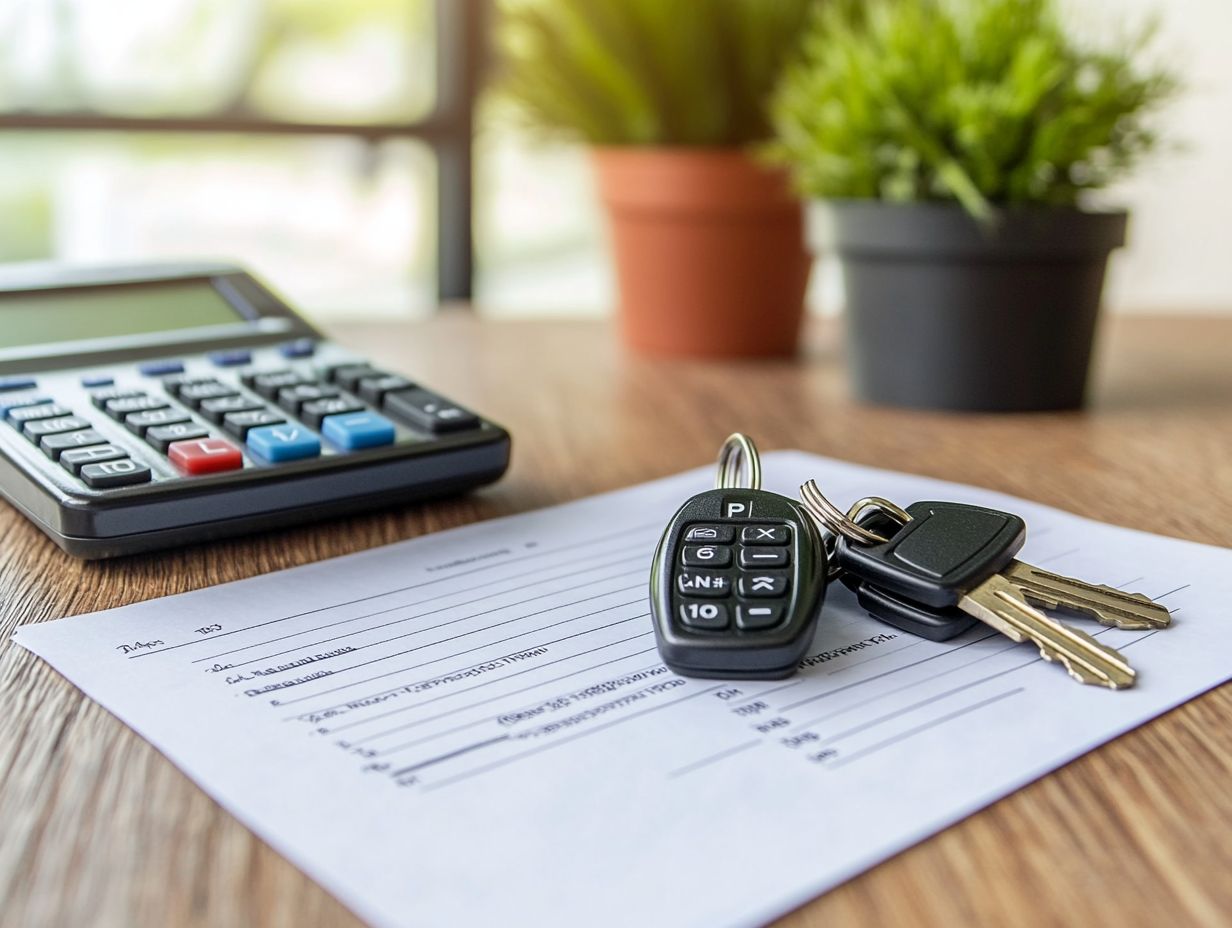
- The cost of owning a car includes depreciation, insurance, maintenance, and fuel.
- Calculating your total car ownership costs is crucial.
- Consider alternatives to car ownership, like public transportation or ridesharing.
The True Cost of Car Ownership
Understanding the true cost of car ownership goes beyond merely considering the purchase price. It includes many factors, such as fuel costs, insurance premiums, maintenance expenses, hidden fees, and financing options.
By conducting a thorough analysis of depreciation rates and monthly payments, while reflecting on your driving habits and potential registration fees, you can budget intelligently for owning a vehicle.
Evaluating different vehicles can reveal potential savings opportunities and enhance your fuel efficiency. This allows you to navigate the intricate landscape of car ownership with confidence.
Beyond the Initial Purchase Price
Your car’s costs extend well beyond just the initial purchase price. To truly grasp your expenses, it’s important to understand the total cost of car ownership, as hidden expenses can significantly impact your budget.
Consider financing options, like interest rates on loans, which can gradually inflate your monthly payments. Various taxes can often take new owners by surprise. Regular maintenance, insurance premiums, and fuel expenses add up to a financial commitment that can easily be overlooked.
When planning for long-term expenses, create a budget that includes unexpected costs. By understanding these hidden costs, you enable yourself to make informed decisions. This ensures that your vehicle choices align seamlessly with your financial goals.
Factors that Contribute to Car Ownership Costs
Several factors play a significant role in determining the total costs of vehicle ownership. You need to consider insurance premiums, fuel expenses, maintenance costs, and the vehicle’s depreciation rate.
Each of these elements can dramatically impact your long-term financial commitment.
Depreciation
Depreciation plays a pivotal role in your vehicle ownership experience. It signifies the decline in your car’s value over time and profoundly affects your overall budget and future resale price.
Grasping how depreciation works allows you to make savvy financial choices. Some vehicles lose value at a much faster pace than others. For instance, luxury cars often endure steep depreciation during their initial years; a brand-new luxury sedan can plummet by around 25% in value the moment it leaves the dealership.
On the flip side, certain brands like Toyota are known for their value retention, with some models depreciating by as little as 15% in the same timeframe. This disparity can lead to considerable differences in long-term costs, influencing everything from your financing options to your insurance premiums.
Insurance
Insurance represents one of the most significant recurring expenses you face as a car owner. Premiums fluctuate based on factors like your driving record and the type of vehicle you possess.
Grasping these premiums is essential for effective budgeting, as they have a direct impact on your monthly expenses. Many car owners underestimate the importance of obtaining multiple insurance quotes. These can reveal substantial differences in costs.
This not only helps secure the best deal but also shows how factors such as age, location, and mileage affect your insurance costs.
By comparing various options, you can better manage your finances and ensure you find the coverage that perfectly aligns with your driving habits and personal circumstances.
Maintenance and Repairs
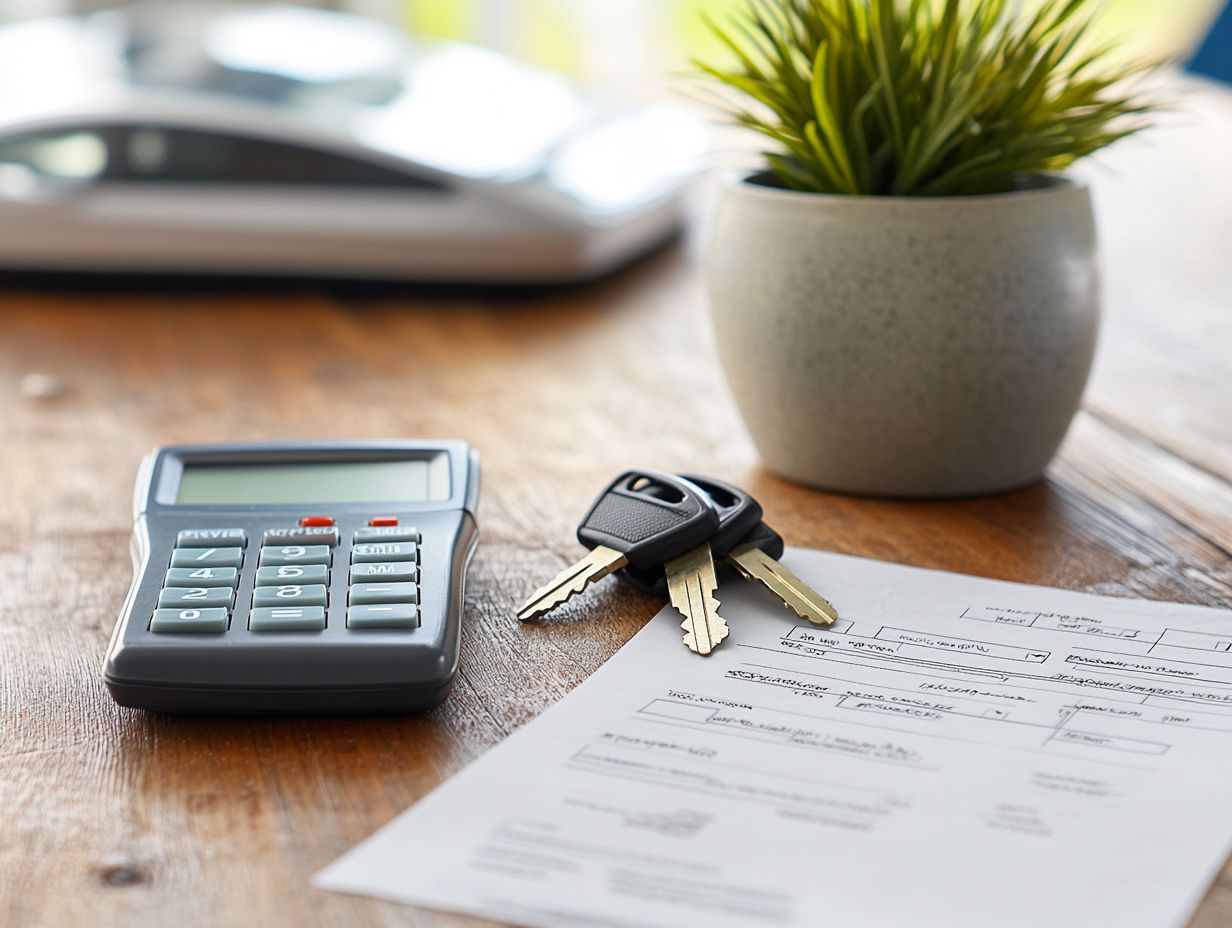
Budgeting for your car? Don t forget about regular maintenance and sudden repair costs they can sneak up on you!
These costs often encompass routine services like oil changes, tire rotations, and brake inspections, all designed to stave off more significant issues in the future. Stay vigilant for sporadic repairs that may arise from accidents, wear and tear, or unexpected mechanical failures.
To manage these expenses effectively, consider setting aside a dedicated monthly budget for maintenance. This proactive approach means that when larger repairs come up such as replacing the transmission or an engine you won t be caught off guard.
Gasoline
Fuel costs, especially gasoline prices, can significantly impact your budget. It s essential to consider both fuel economy and your driving habits.
By understanding how these elements interact, you can unlock substantial savings over time. For example, opting for a more fuel-efficient vehicle or simply adjusting your driving style like avoiding rapid acceleration and maintaining a steady speed can greatly enhance your overall fuel economy.
Implementing budgeting strategies, such as setting aside funds that align with fluctuating fuel prices, allows for more effective financial planning. You should also explore public transportation or carpooling to further reduce expenses.
By focusing on fuel-efficient practices, you can boost your financial health while contributing to a more sustainable environment.
By making smart choices at the pump, you save money and help the environment!
Parking and Tolls
Parking fees and tolls are those sneaky costs that often fly under the radar. These can quickly accumulate and have a significant impact on your overall vehicle ownership budget.
When you’re mapping out your vehicle expenses, it’s essential to include these frequently ignored charges, which can add up from your daily commutes or those occasional road trips. Many underestimate their parking costs, particularly in urban areas where rates can reach dizzying heights. Likewise, toll expenses can vary greatly by route and can become surprisingly steep over time.
To maintain a solid budget, consider tracking these costs over the course of a month. This approach can provide you with valuable insights. Utilizing apps or websites that keep tabs on local rates and discounts can help you plan your travels more efficiently and keep those expenses in check.
Calculating the Total Cost of Car Ownership
Calculating the total cost of car ownership requires a thorough examination of various expenses. You must consider all associated costs over time to effectively budget for your vehicle.
This approach ensures that you re prepared for every financial aspect of owning your car, allowing for a more informed and strategic decision-making process.
Tools and Resources for Estimating Costs
Using effective tools and resources for estimating costs can streamline your budgeting process for vehicle ownership. This enables you to make informed financial decisions.
These tools include online calculators that quickly analyze your monthly expenses and comprehensive budgeting apps that track fuel, maintenance, and insurance costs. Automotive websites provide detailed articles and reviews explaining car ownership costs for specific vehicle types and models.
Financial planners suggest considering factors like depreciation (the value loss of your car over time) and potential resale value. These elements significantly influence your overall cost. By leveraging these resources, you can establish a more accurate budget and plan confidently for your car ownership journey.
Alternatives to Car Ownership
Discover exciting alternatives to car ownership that offer remarkable savings and flexibility. Options like public transportation, ridesharing, biking, and walking provide eco-friendly and cost-effective solutions that enhance your lifestyle and are kinder to the planet.
Public Transportation
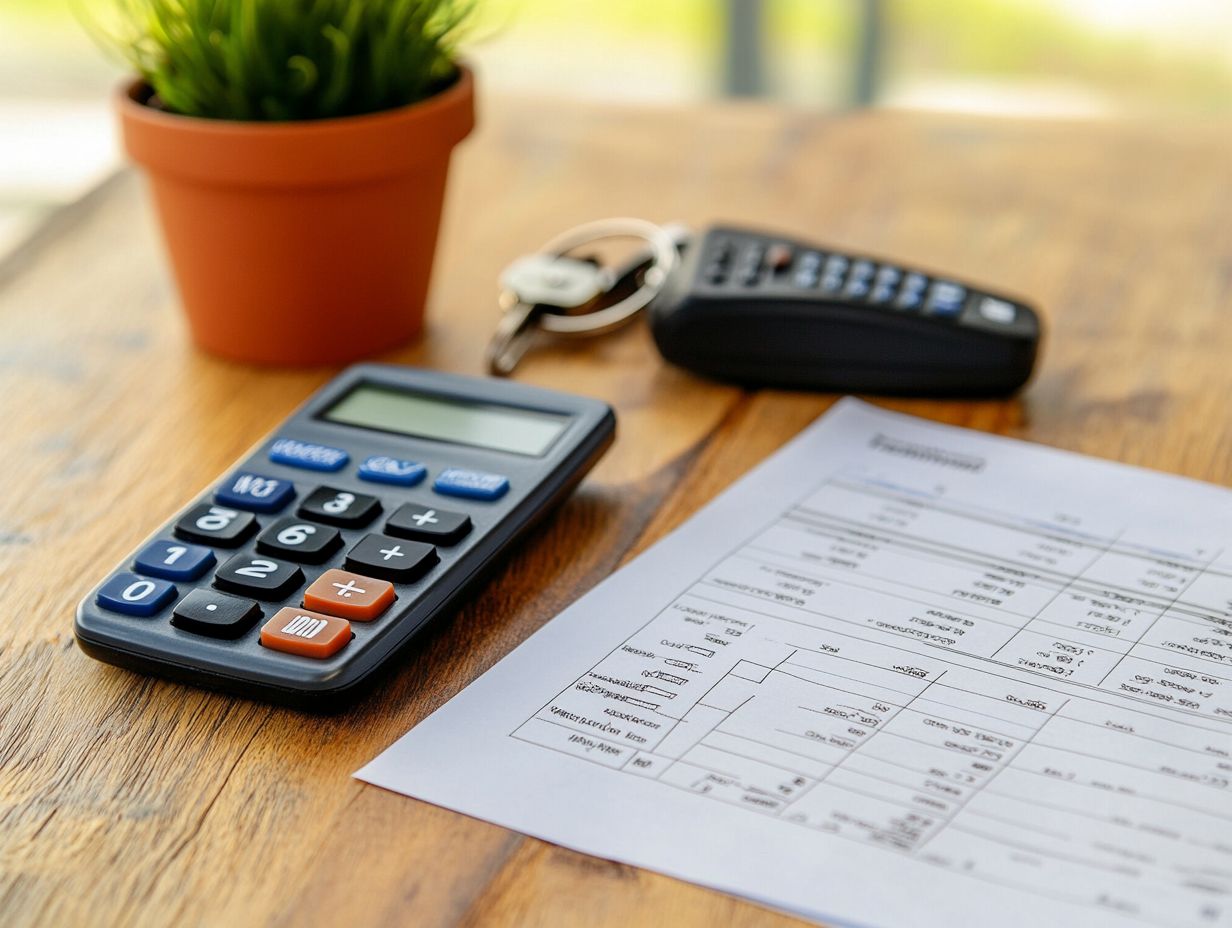
Public transportation offers a cost-effective alternative to owning a car. You can save significantly while enjoying various commuting options.
This option reduces maintenance and fuel costs, making it appealing for budget-conscious individuals. Using buses, subways, or trams, you can avoid parking hassles and reach your destinations with ease.
Choosing public transit is not just practical; it also helps the environment. Public transportation typically leads to lower carbon emissions than private vehicles, improving air quality and reducing traffic congestion. These benefits enhance urban life, making your commute a win-win.
Ridesharing and Carpooling
Ridesharing and carpooling offer you convenient, affordable alternatives to the conventional car ownership model, enabling you to share expenses and significantly reduce your overall transportation costs.
Beyond the financial perks, these options create a sense of community as you connect with neighbors or fellow commuters, enriching your daily travels with meaningful social interactions. Instead of driving solo, sharing a ride can turn your commute into an opportunity for engaging conversations or networking, adding value to what might otherwise be mundane moments.
These practices positively impact the environment by reducing the number of vehicles on the road, which in turn lowers greenhouse gas emissions. By embracing ridesharing and carpooling, you not only make a smart economic decision but also enhance the quality of life for everyone involved.
Biking and Walking
Biking and walking aren t just healthy alternatives to owning a car; they also significantly slash your transportation costs and contribute to environmental sustainability.
When you choose these modes of transport, you save money on fuel, maintenance, and parking fees savings that can really add up over the year. Opting to bike or walk helps you lower your carbon footprint, promoting cleaner air and reducing your reliance on fossil fuels. This choice enhances your lifestyle and encourages your community to invest in more pedestrian-friendly paths and bike lanes.
By embracing active transportation options, you re not just improving your own well-being; you re helping to create vibrant neighborhoods, boost public health, and make a lasting commitment to protecting our planet for future generations.
Tips for Reducing Car Ownership Costs
By implementing effective strategies to reduce car ownership costs, you can unlock significant savings that enhance your overall vehicle experience, all while maintaining a keen handle on your budget.
Maintenance and Fuel Efficiency
Prioritizing maintenance and enhancing fuel efficiency are essential strategies to reduce costs and maximize savings in vehicle ownership.
Regular upkeep ensures that your engine runs smoothly. It significantly contributes to better mileage. When you service your vehicle regularly, you keep crucial components like air filters, oil, and tires in optimal condition. This allows for seamless operation and helps minimize energy waste, leading to more efficient fuel consumption.
A well-maintained vehicle is less likely to break down, which can result in costly repairs. By embracing a proactive maintenance schedule, you can enjoy improved performance and lower fuel expenses. This approach is a wise investment for anyone eager to save money in the long run.
Insurance and Parking Options
Evaluating your insurance options and parking strategies can lead to substantial savings. These are essential elements of a well-crafted budgeting plan for vehicle ownership.
Thoughtfully comparing insurance premiums from various providers helps uncover lower rates that cater to your specific coverage needs, all while avoiding unnecessary expenses.
Choosing the right parking options whether it’s rental garages, street parking, or dedicated lots can save you big bucks every month. Consider how parking expenses can fluctuate widely and impact your overall costs.
Aligning these factors bolsters your money management and fosters a more manageable approach to vehicle-related expenditures, cultivating a practical mindset towards savings.
Considering a More Affordable Vehicle
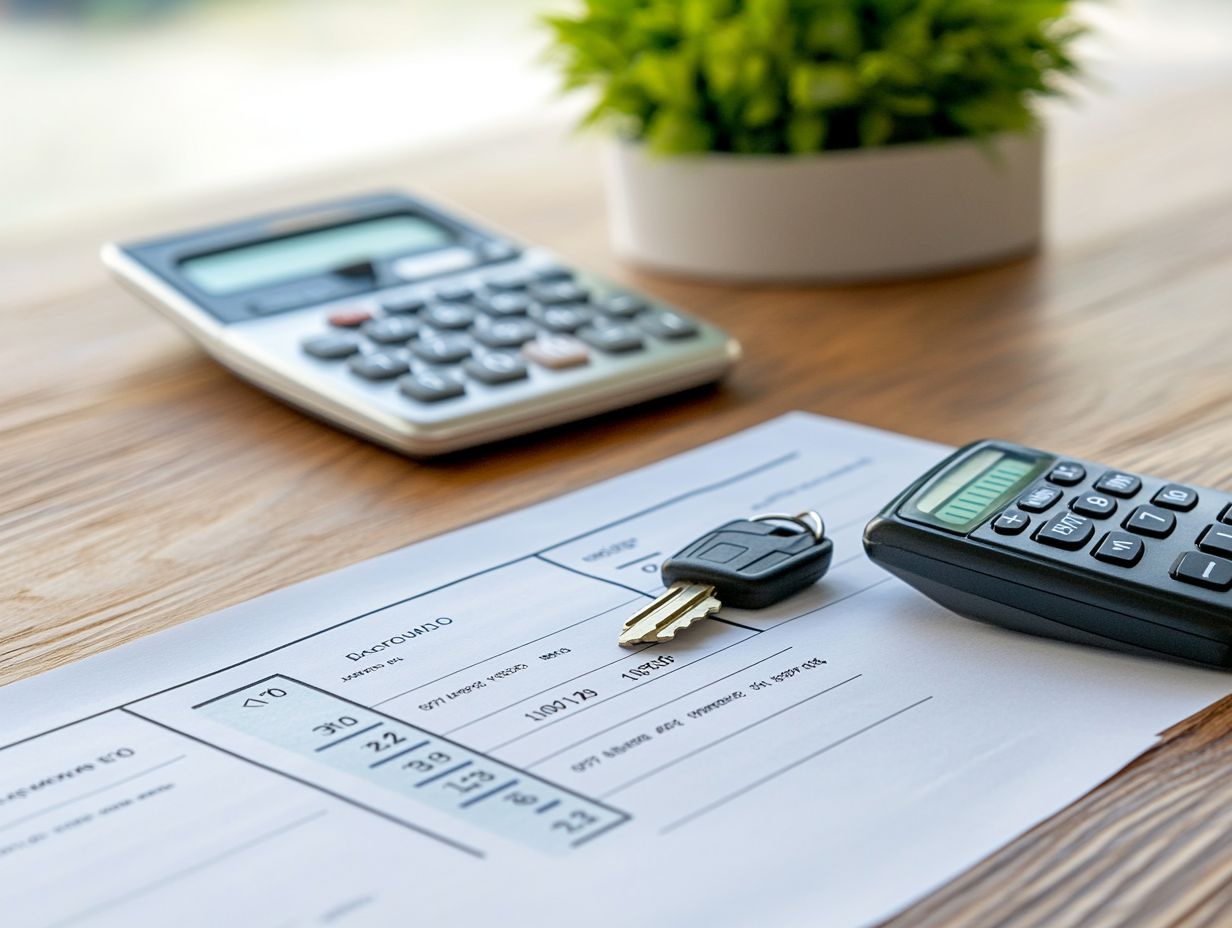
Considering a more affordable vehicle can significantly cut your ongoing costs. This makes it a vital consideration when budgeting for effective vehicle ownership.
By opting for a budget-friendly car, you can enjoy considerable savings not just on the initial purchase price, but also in terms of lower insurance premiums and maintenance expenses. Smaller financing amounts lead to smaller monthly payments, allowing you to allocate funds to other important financial commitments.
Many economical models are engineered for fuel efficiency, translating into substantial savings at the gas pump over time. With fewer complex parts to worry about, these vehicles typically require less frequent servicing. This ensures that your vehicle ownership experience remains hassle-free.
Ultimately, choosing a more affordable option can create greater fiscal flexibility and grant you the peace of mind you deserve.
Frequently Asked Questions
What sneaky costs should you watch out for with car ownership?
The hidden costs of car ownership refer to additional expenses that come with owning a car beyond the initial purchase price. These can include maintenance, insurance, taxes, and depreciation.
Knowing these costs helps you decide if owning a car is right for your budget. It also aids in budgeting and planning for these expenses in the long run.
Maintenance costs can add up quickly and are often overlooked when purchasing a car. Regularly changing the engine oil, rotating tires, and other necessary repairs can be costly. These should be factored into the overall cost of owning a car.
Insurance is a necessary expense for car ownership, and costs can vary greatly depending on the type of car, your driving record, and other factors. It’s important to shop around for the best insurance rates to minimize this hidden cost.
When purchasing a car, you’ll likely have to pay sales tax, registration fees, and possibly personal property taxes. These costs can vary depending on where you live and the type of car you have, but they should be taken into consideration when budgeting for car ownership.
What is Depreciation and How Does It Affect Car Ownership Costs?
Depreciation is when a car loses value over time. As soon as you drive a new car off the lot, it starts to lose worth.
This means when you decide to sell or trade in your car, it will likely be worth less than what you originally paid.
Understanding depreciation is crucial. It helps you calculate the real costs of owning a car.



